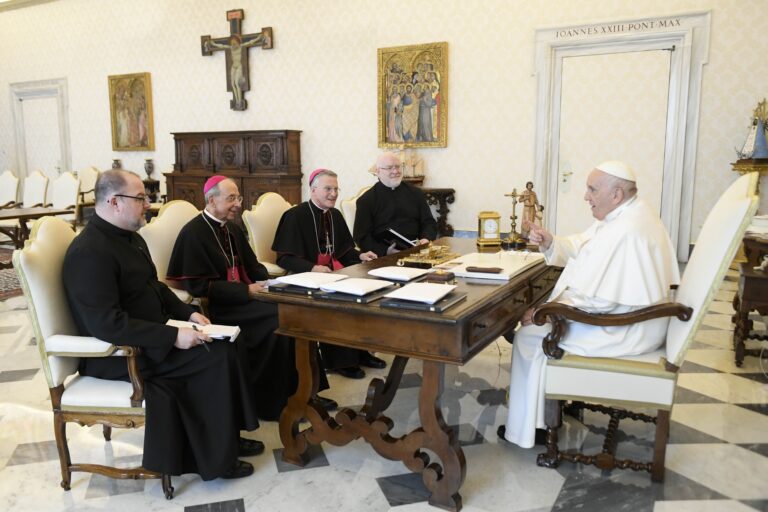The Church in North America has experienced a significant moment of joy and hope in the journey along the synodal path. Gathered in a spirit of prayerful listening, local communities in our dioceses have expressed their joys and their anxieties.
The path led initially to shared spiritual conversations in each of our countries, and then to similar, mutual conversations by delegates from the United States and Canada. During the Continental Assembly, many resonances and tensions were expressed, all of which were spoken out of a great love for Christ Jesus and his Church.
The North American Synod Team laboured to give a synthetic account of the richness of the conversations. The Synod Team has gathered the principal themes that emerged from our Continental Assembly and now propose them for further consideration at the Synodal Assembly to be held in Rome in October 2023.
- Integration of synodal consultation in the local Churches. This would include formation both in synodality and in the spirituality of discernment. Although the synodal way was experienced with such joy on our continent by those who participated, we acknowledge that it is just the beginning.
Much work remains to be done to integrate the synodal style of consultation at the level of the local Churches, as well as at the national and continental levels, to increase participation and reach many in our communities who have not yet even heard of synodality. This includes particular attention to the spiritual formation necessary for personal and communal discernment.
Formation We also urge that formation in the synodal style be encouraged and guided, so that it may be properly understood. Many who chose not to participate conceive of it as a competitive model, opposing laity to clergy. Others see it as insufficiently clear in its methodology, ecclesiology, and aims. Nevertheless, there is the practical matter of rethinking our diocesan and national ecclesial practices and/or structures in a way that truly prioritizes the synodal style.
- The challenge of welcoming those who feel excluded from participation in the life of the Church in a manner that is authentic and faithful to the Gospel and the Catholic faith weighs heavily on the hearts of our people. This tension in individuals and in communities was spoken of often.
Our people perceive that welcoming and serving the wounded and isolated in the world and in the Church is an essential aspect of the mission given to us by the Lord Jesus; yet they also observe that the new complexity of issues before us requires discernment, because it implies both new pastoral initiatives and fidelity to the kerygma that we are to announce publicly.
Hence, many asked what is meant by “radical inclusion,” and what are its pastoral and even doctrinal implications? The term itself elicited widely divergent reactions during our consultations. There also is a need for formation in how to be more welcoming of one another.
- Co-responsibility. A plea for renewed consideration of the mission of all the baptised, with specific attention given to particular vocations, was frequently mentioned. The discernment of how baptismal co-responsibility for the Church’s mission should be appreciated and achieved demands a better understanding of the roles of the laity in general, and of women and young people in particular. Co-responsibility The theme of co-responsibility also touches the frequently raised issue of shared decision-making and the desire for more transparency in Church governance.
Discerning a practical way forward on these issues will require a consideration of current canonical norms and ecclesial structures. Intimately connected to this theme is the need for more integral formation for the whole of Christian life.
- Addressing the unity and communion of the Church in the midst of various kinds of polarization and division. Some polarizations arise within the Church, whereas others originate in the wider society and are transposed into the Church.
Discernment is needed so that local Churches are better able to promote the ecclesiology of communion, rooted in baptism and nourished by the Eucharistic sacrifice. These must be seen as primary sources of our identity and unity as the People of God, and prior to any racial, ethnic, social, economic, political, or ideological differences. This is a challenge for our immediate future.
- A Church that goes out to the peripheries. Much of the conversation in the Continental Assembly concerned the internal workings of the Church, but we also are called to be outward looking. Our people speak often of having heard the call of Pope Francis to go out credibly to the margins. On our continent there is always a danger of forgetfulness of, and indifference to, those who are poor and ostracized.
The North American Synod Team heard through the synodal consultations that our people are asking for more robust formation in this kind of missionary activity. It is vital that the local Churches hear the call to assist the needs of the poor and marginalized churches around the world. This is a concern of the whole Church and should be articulated with greater urgency on the level of the Universal Church.



